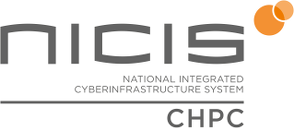Conveners
KEYNOTE 2: Opening Session
- Chair: Dr Samuel Mabakane (CENTRE FOR HIGH PERFORMANCE COMPUTING)
KEYNOTE 2
- Chair: Mr Leon Staphorst (Director: SANReN)
KEYNOTE 2
- Chair: Dr Anwar Vahed ()
KEYNOTE 2: and Prize-Giving Ceremony
- Chair: Dr Happy Sithole (CHPC)
KEYNOTE 2: Intel
- Chair: Dr Happy Sithole ()
Generally, a lot of awareness has been created around Digital Transformation/ the Fourth Industrial Revolution (4IR) with various stakeholders electing to focus on matters of interest to them. However, there are known challenges and requirements for the public service to be able to transform digitally. The presentation would talk about challenges/ issues (people/ process/ technology issues)...
Science and education are increasingly becoming global endeavors. Scientists collaborate internationally and questionnaires indicate that scientists today are more likely to collaborate with partners outside their home institutions than with local research fellows. Students no longer need to physically be on campus to take classes, as they follow courses remotely and can even take a degree at...
This talk discusses two emerging trends in computing (i.e., the convergence of data generation and analytics, and the emergence of edge computing) and how these trends can impact heterogeneous applications. Next-generation supercomputers, with their extremely heterogeneous resources and dramatically higher performance than current systems, will generate more data than we need or, even, can...
Researchers today are generating volume of data from simulations, instruments and observations at accelerating rates, resulting in extreme challenges in data management and computation. In addition to publications, scientists now produce a vast array of research products such as data, code, algorithms and a diversity of software tools. However, scholarly publications today are still mostly...
Users of floating-point arithmetic (floats) have long experienced the disconnect between mathematically correct answers and what a computer provides. Choices made in the 1986 IEEE 754 Standard for floats lead to irreproducible results that destroy the confidence we experience, say, when working with integers. After 33 years, language support for mandated internal flags (rounding, overflow,...
Seven decades of HPC has been empowered by the abstraction of “the von Neumann Architecture” and its many derivatives, driven to a significant degree by Moore’s Law and the exponential growth of device density and concomitant clock rates yielding a performance gain over that period of more than ten trillion for floating point computation. But a perfect storm of recent technology trends has...

